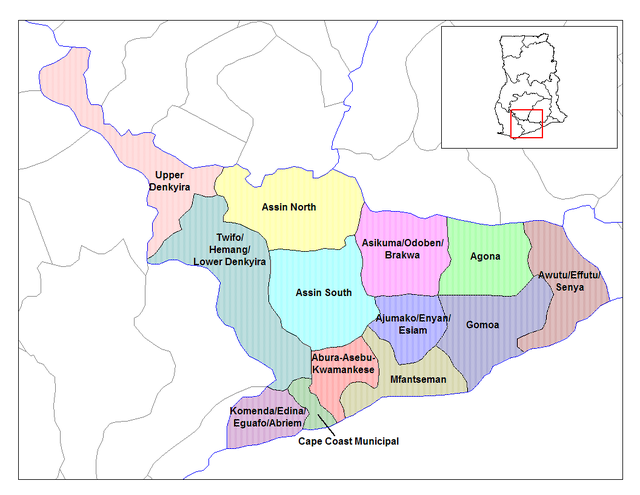Top Qs
Timeline
Chat
Perspective
List of parliamentary constituencies of Ghana
From Wikipedia, the free encyclopedia
Remove ads
This is a list of the 276 constituencies in Ghana that will be contested in the Parliament of the Republic of Ghana from December 2024. There were 275 constituencies at the time of the 2020 Ghanaian general election.[1] One more constituency, Guan, was added in 2023 and was contested for the first time in the 2024 Ghanaian general election.[2][3] The number of constituencies has increased from 260 at the previous election held in December 2012 parliamentary election.[4] Each constituency is represented by a single member of parliament (MP). There were 230 parliamentary constituencies previously.[1]
Remove ads
History
At the time Ghana became an independent country, there were 104 seats in parliament. This increased to 198 after 1965, when Ghana became a one-party state. With the start of the Second Republic in 1969, the number of seats was increased to 140. This did not change further until the start of the Fourth Republic when it was increased from 140 to 200. Following the December 2000 election, the number of seats was increased.[5] After the 2000 population census, the number of districts increased from 110 to 138. Subsequently, the Electoral Commission of Ghana conducted a demarcation exercise which increased the number of constituencies from 200 to 230.[6] The total list of constituencies was increased to 275 before the 2012 Ghanaian general election.[1] This was done by the Electoral Commission of Ghana after the final results of the 2010 population census became available.[7][8] Additionally, after referendum in December 2018, the number of administrative regions has also been increased from ten to sixteen.[9]
Remove ads
Constituencies per region
Ahafo Region

The Ahafo Region is one of the two new regions carved out of the Brong-Ahafo Region, which was divided into three regions following the December 2018 referendum.
Ashanti Region
Summarize
Perspective

The number of constituencies in this region increased from 33 to 39 in 2004 and to 48 in 2012 before the 2012 Ghanaian general election. Some new districts were created in 2008, affecting the location of certain constituencies.
Remove ads
Bono Region

The Brong-Ahafo Region was split into three regions following the December 2018 referendum.
Remove ads
Bono East Region
The Bono East Region is one of the two new regions carved out of the Brong Ahafo Region. The Brong-Ahafo Region was divided into three regions following the December 2018 referendum.
Remove ads
Central Region
Summarize
Perspective

The number of constituencies in the region increased from 17 to 19 in 2004 and to 23 in 2012 before the 2012 Ghanaian general election.
Remove ads
Eastern Region
Summarize
Perspective

The number of constituencies was increased from 26 to 28 in 2004 and to 33 in 2012 before the 2012 Ghanaian general election.
Remove ads
Greater Accra Region
Summarize
Perspective

The number of constituencies increased/spread from 22 to 27 in 2004 and to 34 before the 2012 Ghanaian general election.
North East Region
The Northeast Region was created following the December 2018 referendum.
Remove ads
Northern Region

The number of constituencies increased from 23 to 26 in 2004 and to 31 in 2012 before the 2012 Ghanaian general election. After the division of the region into Northern and Northeastern regions, the region now has 18 constituencies.
Remove ads
Oti Region
The Oti Region was created following the December 2018 referendum. There were 8 seats originally, but Guan was added before the 2024 general election.
Savannah Region
The Savannah Region was created following the December 2018 referendum.
Upper East Region

The number of constituencies increased from 12 to 13 in 2004 and to 15 in 2012 before the 2012 Ghanaian general election.
Upper West Region

The number of constituencies increased from 8 to 10 and to 11 in 2012 before the 2012 Ghanaian general election.
Volta Region

The number of constituencies increased from 19 to 22 in 2004 and to 26 in 2012 before the 2012 Ghanaian general election. This was reduced to 18 after the December 2018 referendum which led to the creation of 6 new regions. The old Volta Region was divided into the Oti and Volta Regions.[10]
Western Region

The number of constituencies increased from 19 to 22 in 2004 and to 26 in 2012.
Western North Region
See also
Notes
External links and sources
Wikiwand - on
Seamless Wikipedia browsing. On steroids.
Remove ads
